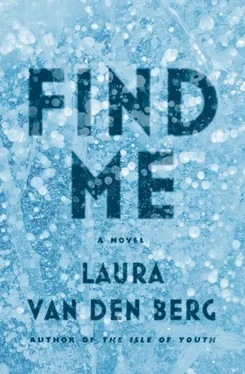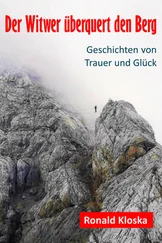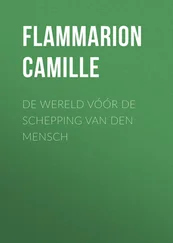* * *
When we leave the barn, the afternoon sun is low and fading, like all the color is being slowly sucked out, and we realize we are on the edge of a property. From a distance, we can see an old house on a hill, a two-story with a dormer roof and a sagging wraparound porch. The dark splotches on the roof where shingles are missing look like water curving around land on a map. The white paint is peeling. The front door is knobless. A neon yellow skull has been graffitied in the center. A tall metal frame stands to the left of the house, as though the structure was abandoned mid-renovation.
A young woman is on the porch in a nubby sweater and corduroy pants and rubber boots. I appreciate the soft look of her clothing. On the road softness is something I miss.
There is something strange about her body, something misshapen, and it’s not until we reach the edge of the front yard that I see the white angel wings hanging from her back.
She waves to us, this woman.
We cross the yard, through the mud and slush. We watch the woman pet her wings. We tell the woman our names. We say we’re looking for a place to sleep. We ask if she can help us.
The woman’s name is Darcie. She has freckles on her eyelids. The tips of her front teeth are stained caramel. She lives here with a man, Nelson, and they call this place the Mansion. She tells us we can stay for as long as we like.
“The Mansion always has room,” she says, opening the door.
Inside she gives us water in Mason jars. There’s grit floating in the bottom, but we couldn’t care less. We hold our jars with both hands and gulp the water. I close my eyes and feel the cool slip down my throat. I chew the grit when it gets stuck in my teeth. Exhaustion has brought on strange pains in my face: aches in the jaw, along my hairline, in the spaces between my eyes.
There is no sign of this other person, this Nelson. The Mansion is warm and quiet.
“Where did you come from?” Darcie wants to know.
We’re standing in a dim kitchen, and I can make out a big metal sink and long windows. White candles, burned to waxy nubs, on the sills. An old boxy refrigerator. The door is ajar and I catch the scent of rot.
A blue tile floor streaked with mud, like a sky with a storm rolling in.
“From the west,” we reply.
Darcie rests a fist under her chin, like she’s giving careful thought to our origins, to what it means to have come from the west. Two downy feathers fall from her wings and into the shadows below.
When we ask where she came from, she tells us that she cannot remember.
* * *
Darcie gives us a room on the second floor. This room is empty except for a bare mattress with a white sheet. The floorboards are swollen. The walls are peeling. A window overlooks the backyard, a small sprawl of land surrounded by a halo of leafless trees and then dark woods, the rounded treetops stretching into the beyond. On one wall, we find a series of stick figures drawn in pencil. The figures are taking shits and fucking and choking each other. LIFE WHO NEEDS IT someone has written below them in big jagged letters.
Once we’re alone, the sky turning dark outside, Marcus asks how I’m feeling and I tell him I’m feeling sad.
I sit down on the mattress. “I thought we would have gotten farther by now.” When I left the Hospital I thought I would just keep going and going, all the way to Florida. I didn’t foresee being so thoroughly beaten by the elements, for my mother to still feel so far away.
“Here’s something,” Marcus says. “In a bathroom in West Virginia, I saw a sign telling people to not use toilet water for drinking. There was a drawing of a man dunking his head in the toilet with a big red X over it.”
I laugh and tell him about the recovery position sign I saw in a bathroom, and then he grabs my waist and we take turns rolling each other onto our sides, into the position of recovery. The skin on his arms is cold and gummy. My intestines twist around.
We should be exhausted, tranquilized with sleep, but instead we keep assuming the recovery position. After all, we have so much to recover from. Finally we settle down on the mattress, still quivering with laughter, nearly delirious. We lie on our backs, the sheet tucked under our arms, our feet sticking out. The mattress fabric is printed with pink and green flowers, the stems faded. I pull off the gardening gloves. My fingertips are pruned.
“Right now I don’t feel like I will ever be able to move again,” I tell Marcus.
“Tomorrow,” he says. “We’ll feel better tomorrow.”
We fall asleep on our backs, our feet hanging over the edge of the mattress, heels touching the floor. We do not dream.
In the morning, Marcus and I wake curled on the mattress. In our sleep, our bodies have taken on new positions. We are facing each other, legs tucked, full of aches and hunger. My tongue is stuck to the roof of my mouth. My stomach makes a rumbling so loud it startles me. The soles of my feet are so blistered and bruised, it looks like they’re evolving into something not quite human, concentric circles of dead skin, bright purple blotches.
My toenails are sharp.
I lie awake for a long time before I feel capable of moving. I face away from the window and watch a black beetle scuttle up the wall and think about how this house could be our recovery position.
We find Darcie at the foot of the stairs. Her hair is long and blonde, dark at the roots, the ends tangled in her angel wings. She wants to know about our dreams, but we tell her that we didn’t dream anything or at least not anything we can remember.
“Just you wait,” Darcie says.
In the Mansion, it is dry. In the Mansion, we have a place to sleep and it does not cost money. There is food. A mushy piece of fruit. A can of cold tomato soup, opened with a pocketknife, the blade dull with rust. On the second floor, a claw-foot bathtub that can be filled with the rainwater Darcie and Nelson collect in black plastic tubs.
Out there we don’t know what will happen to us. The cities are strange, the bus drivers unreliable. We have been temporarily slowed by the needs of the body, the body that doesn’t care that my mother is still far away in Florida, that she is still in need of finding. The body that only cares for food, water, sleep.
In the kitchen, we each eat a piece of brown bread and a sour orange. Marcus peels his orange carefully and eats one wedge at a time. I don’t take off the skin. I bite right into the peel and juice spills down my chin.
After we finish, Darcie tells us that she wants to give us a tour.
In the living room, one side of the wall is papered with gold leaves. The other side is bare plaster, marked with lines of rust and brown clay that look like streaks of shit. Silver lamps, black with tarnish, sit on the floor. A red velvet armchair with a fist-size hole in the seat stands in a corner. The fabric at the bottom of the chair sags. More holes in the floorboards, the edges splintered. In the center of the ceiling, a skylight. The clouds above are gray and swirling. The fireplace is made of beautiful blue marble, the hearth packed with sticks and leaves and ash.
“This house will play tricks on you,” she says.
We keep looking around. Rain clicks against the skylight. The ceiling darkens and swells.
Darcie bends down, picks up the thin string lying on the floor, and pulls. The trap door that opens is the size of a dumbwaiter. She crouches inside it. Marcus and I move toward her, inspecting. Up close her feathers are dingy and frayed.
“See?” she says from inside the door, raising her hands. She is a woman of average size, but her hands are small as a child’s. “Tricks.”
Next we go into the kitchen, to the corner where the walls don’t meet in a smooth line, but are separated by a slim column, like a body with an extra feature: a sixth finger, a surplus molar. There’s a small hook on the wall, something you’d hang a coat on, and when Darcie pulls the hook, the column, which is some kind of mechanized door, slides open. There is the scent of cedar, a wave of dust.
Читать дальше












